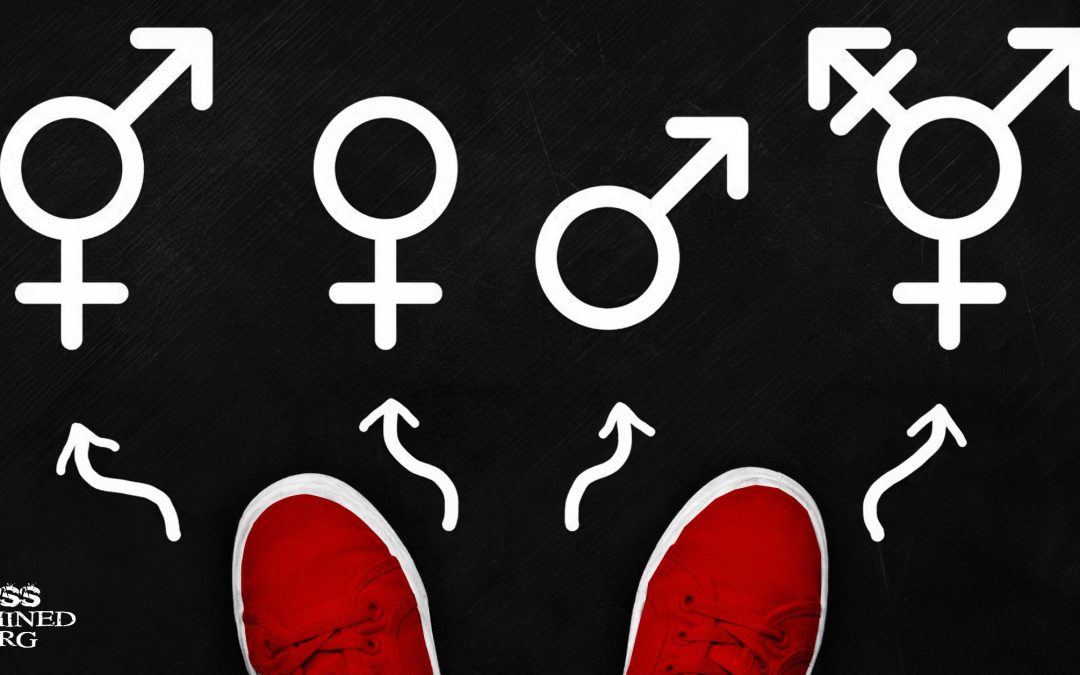How should the church engage those who experience same-sex attraction or gender dysphoria? In response, I want to highlight seven basic principles that the church must embrace.
Affirm The Divine Image
Genesis 1 is clear that everyone, without qualification, is made in God’s’s image. That is to say; whether someone is attracted to the opposite sex or the same sex, they are equally image-bearers of God. The same goes for individuals who experience gender dysphoria. One’s’s feelings or attractions in no way mitigates against this universal status.
As Christians, we should enthusiastically embrace this truth. Nobody — not the government, the church, or anyone else — can bestow a higher status on each person than God already has. Moreover, not only did God create all people in his image, he thought so much of his people that he paid a steep price for their redemption by shedding his own blood for their sins.
Acknowledge Our Collective Sinfulness
While God created everything good, we all possess a sin nature because of the fall. David acknowledges that he inherited this sin nature from the time of his birth (Ps. 51:5). Romans 3:23, likewise, affirms that we have all sinned and fallen short of God’s glory. And lest we think we’re just a little sinful, Scripture paints a much gloomier picture than this. Sin pervades our entire being (Rom. 8:7-8).
One of the ramifications of our fallenness is that we have a tendency to minimize our own sins while maximizing the sins of others. Yet, Jesus clearly condemns this hypocrisy (Mt. 7:1-5). Instead, we must take a realistic assessment of our own hearts. And when we do, we realize that if it weren’t for the grace of God, we would all die in our sins.
All that to say, just because we may not experience homosexual or transgender temptations doesn’t mean that our sin isn’t just as wicked. Lusting after other women, harboring bitterness, lashing out in anger, and spreading gossip are all acts of rebellion against God. It’s’s unbiblical to treat others as if they have a log in their eye and pretend we only have a speck. When we do this, we’re being judgmental hypocrites.
Know Jesus’s Universal Expectation
Jesus preached “Repent and believe the gospel” (Mk. 1:15). To claim Christ as Lord, one must abide by these words. Unfortunately, many have watered down this message by excluding repentance.
Yet, Jesus never suggested that we could follow him without turning from our sins. Elsewhere, he states, “Whoever wants to be my disciple must deny themselves and take up their cross and follow me” (Mk. 8:34). In other words, whether you self-identify as gay, transgender, or as straight, Jesus demands that you deny yourself daily. And the reason we are called to deny ourselves is because we don’t actually own ourselves. We belong to Jesus. Not only did he make us, he bought us with his blood.
The very message of repentance and denying oneself daily implies that ongoing temptations and struggles will persist throughout the Christian life. But the true sign of a Christian is that they recognize their temptations as contrary to the will of God, repent if they succumb to those temptations, and seek to obey Jesus moving forward.
Recognize That Holiness Is The Goal
First, Peter 1:16 states, “You shall be holy, for I (God) am holy.” Holiness is the calling for all believers. But this raises the question: “What does holiness look life for those with same-sex attraction or gender dysphoria?” Does holiness mean they will stop being attracted to members of the same sex or that their gender dysphoria will disappear?
I believe holiness can manifest itself in different ways for people with these struggles. One way is living a celibate lifestyle. British pastor Sam Allbery, and author of Is God Anti-Gay? Has chosen this path. Even though Allberry continues to experience same-sex attraction, he knows that pursuing those attractions would be sinful and so chooses to remain celibate. It’s noteworthy that Jesus indicated that celibacy was the only alternative to marriage (Mt. 19:10-12).
Others have chosen to marry persons of the opposite sex and start families despite ongoing same-sex attractions. Rebecca McLaughlin, author of Confronting Christianity, has chosen this path. In her book, Rebecca acknowledges she still experiences same-sex attractions but knows that pursuing those attractions would be disobedience. She even admits to still dealing with temptations towards members of the same sex. But she has chosen to deny herself to follow Jesus.
And sometimes, people stop being attracted to members of the same-sex altogether. We must acknowledge that this doesn’t happen in most cases, but for people like Rosaria Butterfield, it has. Rosaria details this transformation in her book Secret Thoughts of an Unlikely Convert.
In 1 Corinthians 6:9-11, Paul lists several lifestyles that will not inherit the kingdom of God — one of which was “men who practice homosexuality.” But in verse 11, he asserts, “And such were some of you. But you were washed, you were sanctified, you were justified in the name of the Lord Jesus Christ by the Spirit of our God.” I take this to mean that there were people in the Corinthian church who used to practice homosexuality but turned from that lifestyle upon conversion.
I don’t believe this means that the struggles and temptations completely go away. Anyone with a half-decent understanding of biblical theology knows that Christians continue to struggle as we await future glory (Rom. 8:20-23). This is certainly true of me. So we should have realistic expectations that those who experience same-sex attractions and gender dysphoria will often continue to struggle as they face temptations the rest of their lives.
Therefore, the goal for the same-sex attracted person isn’t that they become “straight.” The goal is that they be holy as God is holy. And we should have enough room in our understanding of sanctification to know that this will look different for different people.
Be People Of Love
One of the surest signs of a Christian is their love for others (Jn. 13:35). It is never appropriate for us to be condescending or harsh (Prov. 15:1). Unfortunately, many of us have really missed the mark on this one. While not all the criticism is fair, we haven’t always been known as people who demonstrate the love of Christ towards the LGBTQ community.
As we think about Christ, he was the most loving person to ever live. And we’re told that he was full of both grace and truth (Jn. 1:14). Biblical love perfectly balances these two.
We read in 1 Corinthians 13:6 that love “does not rejoice in wrongdoing, but rejoices with the truth.” Therefore, it is not loving to affirm homosexuality or transgenderism in the same way that it’s not loving to affirm a woman’s anorexia and encourage her to get liposuction because she feels overweight. The loving thing to do is to gently speak the truth to her and remind her that her feelings are deceiving her. In the same way, Christians must speak the truth in love to those who experience same-sex attraction or gender dysphoria (Eph. 4:15). It is not loving to encourage a lifestyle that does not promote spiritual flourishing.
But while we speak the truth, we must do so with a spirit of gentleness. Paul reminds us in Galatians 6:1-2, “Brothers, if anyone is caught in any transgression, you who are spiritual should restore him in a spirit of gentleness. . . . Bear one another’s burdens, and so fulfill the law of Christ.” No one should beat anyone over the head with a Bible. No one should “come down hard” on another. Doing so contradicts the clear commands of Scripture.
Bearing one another’s burdens requires a great deal of empathy. It requires putting oneself in someone else’s shoes in an attempt to understand the challenges they face. It requires having conversations with those who experience different temptations than us and seeing that person as a fellow human being who bears God’s image.
And if we approach people with a spirit of gentleness, we will make it easier for them to share their struggles with us. Imagine how hard it must be for people to open up about their same-sex attraction when people in the church speak about their struggle so harshly. Empathizing doesn’t mean accepting sin. But it does mean being gentle. After all, Jesus was “gentle and lowly in heart” (Mt. 11:29).
Be Like Their Family
For many who experience same-sex attraction or gender dysphoria, celibacy may seem like the only real option for them. While God has changed people’s orientation, and while many have gotten married despite ongoing same-sex attraction, celibacy is the most realistic option for many. But with singleness, comes the fear of loneliness. And we must understand that loneliness is one of the greatest struggles single people deal with — same-sex attracted or not.
But this shouldn’t be. If the church lived out its mission, nobody would ever be lonely. Unfortunately, we have idolized the family with the minivan at the expense of our single brothers and sisters. This is wrong. The church should champion singleness. After all, Jesus himself was single. Paul champions singleness in 1 Corinthians 7. He goes so far as to say that singles are an incredible gift to the church.
Jesus declared in Mark 10:29-30, “Truly I tell you, no one who has left home or brothers or sisters or mother or father or children or fields for me and the gospel will fail to receive a hundred times as much as this present age.”
Sam Allberry writes, “The gospel can be relationally costly. But it is also relationally generous. What we leave behind does not compare to what we receive back from Jesus.” 1
As churches, we must do a better job of inviting singles into our families. No single should be alone on holidays. No single should eat Sunday lunches by themselves. If we say we want to help same-sex attracted people, we need to do everything we can to make sure they feel like they’re part of our family.
Find Our Identity In Christ
You’ll notice I haven’t labeled anyone as “gay” or “lesbian” in this blog series. Instead, I use the phrase “same-sex attracted.” It’s a bit tedious, but I want to make it clear that nobody is defined by their sexuality. This message, though, runs counter to our sexed-up culture. The culture says you are your sexuality. And that not expressing yourself sexually is unhealthy.
Of course, when we buy the narrative that our identity is wrapped up in our sexuality, then not embracing one’s sexual desires seems untenable. Celibacy seems so “old-fashioned.” But when we understand that our identity is rooted much deeper than our physical attractions, we realize that we don’t have to embrace those attractions to live a fulfilling life.
Our relationship with Christ supersedes everything. And because I am in Christ, and Christ is in me, then no matter what earthly relationships I experience, my identity remains unshakeable. Jesus is clear that our familial relationships will pass away in eternity (Mt. 22:30). But our relationship with Christ remains forever.
Concluding Thoughts
My hope is that God has used these articles in your life for good. If you’re someone who experiences same-sex attraction or gender dysphoria, I hope you will see that Jesus offers you so much more than this world has to offer. He is so much more fulfilling and satisfying than any earthly relationship. People will disappoint. Jesus will never let you down. I also hope you will see that your attractions or feelings don’t disqualify you from faithful Christianity. More important is how you respond to those feelings. And my prayer is that you will find a healthy local church that will be your family and encourage you in your daily walk with Jesus.
If you’re someone who agrees with me that God has designed marriage and sexuality to exist within a heterosexual marriage, I hope you will see there are good reasons for believing what you believe. I also hope that you’ll see yourself as a fellow sinner who daily relies on the grace of God.
Recommended resources related to the topic:
Correct, NOT Politically Correct: How Same-Sex Marriage Hurts Everyone (Updated/Expanded) downloadable pdf, Book, DVD Set, Mp4 Download by Frank Turek
American Apocalypse MP3, and DVD by Frank Turek
The Case for Christian Activism MP3 Set, DVD Set, mp4 Download Set by Frank Turek
You Can’t NOT Legislate Morality mp3 by Frank Turek.
Fearless Generation – Complete DVD Series, Complete mp4 Series (download) by Mike Adams, Frank Turek, and J. Warner Wallace
Legislating Morality: Is it Wise? Is it Legal? Is it Possible? by Frank Turek (Book, DVD, Mp3, Mp4, PowerPoint download, PowerPoint CD)
Ryan Leasure holds a Master of Arts from Furman University and a Masters of Divinity from the Southern Baptist Theological Seminary. Currently, he’s a Doctor of Ministry candidate at the Southern Baptist Theological Seminary. He also serves as a pastor at Grace Bible Church in Moore, SC.
Original Blog Source: https://bit.ly/3hklV1f


















